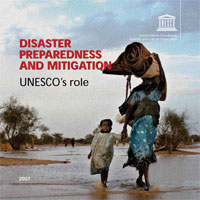Natural Disaster Reduction

- © UNESCO 2007
The occurrence of natural disasters are on the rise. Images of the devastating Myanmar cyclone and China Sichuan earthquake will remain with us for a long time. Disaster preparedness and mitigation are among the key objectives in UNESCO’s Strategy. Operating at the interface between education, science, the social sciences, culture and communication, UNESCO has a vital role to play in constructing a global culture of disaster risk reduction. The Organization is engaged in the conceptual shift in thinking away from post-disaster reaction to pre-disaster action. Through its broad mandate and expertise, UNESCO is helping countries to reduce their vulnerability to natural hazards and build their capacity to cope with disasters. Furthermore, UNESCO provides to governments practical and scientific advice on disaster reduction and a forum to work together to find solutions in this area.
UNESCO has many programmes in place that deal in one way or another with the study of natural hazards (earthquakes, volcanic eruptions, landslides, floods, tsunamis, droughts) and the mitigation of their effects. These programmes help us understand the mechanisms of natural hazards and to analyse why some of these hazards turn into disasters.




